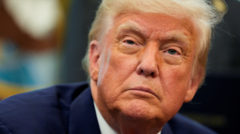Amid rising tensions between India and Pakistan, Donald Trump's mediation offer on the Kashmir dispute has put India in a precarious situation, stirring political debate and concern over the implications for bilateral relations.
Trump's Kashmir Mediation Proposal Stirs Controversy in India

Trump's Kashmir Mediation Proposal Stirs Controversy in India
The former President's recent announcement regarding third-party mediation in Kashmir has put India in a difficult position as it navigates its longstanding policy against external intervention in the conflict.
In a dramatic turn in South Asian geopolitics, Donald Trump’s proposal for U.S. mediation in the long-standing Kashmir dispute between India and Pakistan has sent ripples through India’s foreign policy landscape. After four days of intense cross-border conflict, Trump announced on social media that both nations had agreed to a "full and immediate ceasefire," a move attributed to U.S. intervention. He expressed his willingness to assist in finding a solution for Kashmir, a territory claimed by both countries since the partition of British India in 1947.
Kashmir has remained a contentious issue between India and Pakistan, with both nations administering parts of the region but asserting claims over the entirety. India has traditionally resisted third-party involvement, viewing it as a violation of its sovereignty. The Indian government has reiterated that Kashmir is an integral part of India’s territory, rejecting any negotiations that might include external mediators.
The recent outbreak of hostilities began when India conducted airstrikes targeting what it identified as terrorist sites in Pakistan, following an assault that killed numerous tourists in Indian-administered Kashmir. This escalation saw both countries deploying fighter jets and drones, raising fears of a broader military conflict.
Trump's mediation offer has sparked significant unease within Indian political circles. Former Indian Foreign Secretary Shyam Saran remarked that the proposal contradicts India's long-standing policy opposing third-party mediation in the Kashmir issue. Growing challenges to India’s diplomatic approach are evident, with the opposition Congress party demanding clarity on whether this marked a shift in India’s historical stance regarding talks with Pakistan.
U.S. Secretary of State Marco Rubio’s statement appeared to further complicate matters by suggesting that both countries would engage in dialogue on various issues at a neutral location, prompting reactions in India that range from skepticism to concern about internationalizing the Kashmir conflict.
The Modi government's position has become increasingly hardened since the revocation of Jammu and Kashmir’s special status in 2019, an action that intensified internal dissent and protests. Although Foreign Minister Subrahmanyam Jaishankar affirmed India’s commitment to combating terrorism, his comments did little to alleviate speculation on India's willingness to engage further with Islamabad.
In contrast, Pakistan views the U.S. mediation initiative as a potential breakthrough in a relationship characterized by mistrust. Pakistani analysts welcome Trump’s involvement as a chance to bring international attention to the dispute, advocating for ongoing dialogue as a means to avert future escalations.
India’s diplomatic history has seen it navigate international relations delicately, especially as it aligns with the U.S. against the rise of Chinese influence in the region. Yet, the Trump administration’s unexpected push for mediation in Kashmir presents a balancing act for Delhi. The challenge lies in upholding its rejection of external mediation while fostering its crucial economic and military partnerships with Washington.
As the situation progresses, the Indian government faces the critical task of addressing domestic political pressures while maintaining an assertive stance on national security and its sovereignty in Kashmir. The ramifications of Trump’s comments could have lasting impacts on India-Pakistan relations, and how the Modi administration responds may shape the future of diplomacy in South Asia.





















